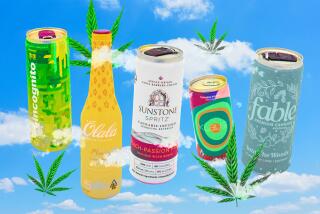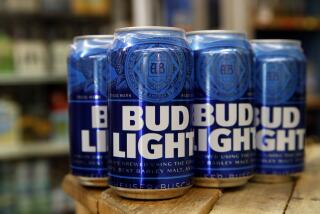7 Up Thirsting for That Old Fizz in a Tough Market
- Share via
Remember the “Uncola” commercials of the 1970s that 7 Up used to cleverly differentiate its lemon-lime soft drink from cola clones Pepsi and Coke?
That’s the problem facing 7 Up, the soft drink brand that’s now owned by England’s Cadbury Schweppes. In an industry where youthful consumers dominate sales, too many of the soft drink’s fans are old enough to remember the popular television ad campaign’s lilting island cadence and actor Geoffrey Holder’s enchanting voice-overs.
“We’ve got a great name and great brand equity,” said Jim L. Turner, chief executive of the Dallas-based bottling company that distributes 7 Up in Southern California. “But we’re not attracting enough new drinkers--particularly higher-consumption youngsters.”
The No. 4 soft drink brand during the mid-1980s, 7 Up has since tumbled to No. 8, even as citrus-flavored competitors Sprite and Mountain Dew have grown.
Cadbury will unveil its newest market-share battle plan in December with teaser ads that promote a new advertising campaign set to debut during the Super Bowl on Jan. 31. The ads, targeting 12- to 24-year-olds, will build upon 7 Up’s “Uncola” heritage by asking, “Are You an Un?” They will also appear during youth-oriented TV programs such as “Dawson’s Creek,” “Ally McBeal” and “Saturday Night Live.”
Putting the fizz back in 7 Up’s advertising isn’t Cadbury’s only challenge. The company, which also owns the Dr Pepper, A&W; root beer and Canada Dry ginger ale and mixer lines, also is scrambling to build a national bottling system that can compete with the increasingly efficient distribution systems that PepsiCo Inc. and Coca-Cola Co. use to get their products to wherever thirsty consumers congregate.
But industry observers say Cadbury’s Plano, Texas-based Dr Pepper/Seven Up Inc., faces a tough uphill fight.
“It’s interesting to compare 7 Up to Sprite,” said Kevin Lane Keller, a marketing professor at the Amos Tuck School of Business at Dartmouth College. “Sprite got to where it is by making itself be seen as more contemporary, while 7 Up has had such a struggle over the years just to get positioned properly.”
Coke Joins the Lemon-Lime Fray
The challenge for 7 Up is getting even tougher, because Coke has already rolled out its own lemon-lime drink, Surge, and Pepsi is expected to begin nationwide distribution of Storm, a lemon-lime drink now being test-marketed around the country, including the Bay Area.
“7 Up is perceived as a rather stodgy old brand by young people,” said John Sicher, editor of Beverage Digest, a journal of the industry. “Repositioning it is going to be a very difficult challenge, something like what General Motors has been doing for the past few years with Oldsmobile.”
Cadbury’s success with 7 Up will depend on whether the product can be repositioned as one of the sodas of choice among youthful consumers, who drink most of the soft drinks poured in the U.S. That’s an especially tough challenge because media-savvy teens don’t like ads that preach to them.
“They’re very sophisticated in how they view the media,” said Jim Trebilcock, senior vice president of marketing for Dr Pepper/Seven Up. “They know when you’re trying to pull the wool over their eyes and they don’t want to be told what to think.”
Rewards are rich for companies that figure out how to talk to teens and young adults. The “obey your thirst” ads for Sprite, with their anti-advertising posturing and urban appeal, have been credited with reinvigorating that brand.
So, rather than clubbing potential customers over the head with a tired Madison Avenue message, 7 Up’s ads will try to play on the “trust no one” theme running through popular TV shows and movies such as “The X-Files” and “Men in Black.”
The campaign by New York-based Young & Rubicam Advertising will portray Pepsi and Coke as the bad guys. Commercials will, for example, refer to a soft drink “syndicate” that’s trying to keep younger consumers from drinking truly refreshing beverages. And, instead of squeaky-clean kids, these ads will depict a darker, hipper crowd.
“We’re keeping it fun and entertaining,” Trebilcock said. “You can’t just come out and say ‘drink 7 Up because it’s cool.’ Because that will be taken to mean it’s not cool.”
It’s wonderful, observers say, when a top-flight soda commercial from Madison Avenue clicks with viewers. But it’s all for naught, they quickly add, if bottlers can’t get the goods to supermarkets, convenience stores, newsstands and vending machines along Main Street.
Bottling System Needs Improvement
Coca-Cola’s bottling system is seen as the gold standard in the industry. Coca-Cola Enterprises, a separate company that handles 70% of Coke’s volume, and Coke’s five largest bottlers distribute 88% of its U.S. volume.
Pepsi’s bottling division distributes about two-thirds of the company’s total volume, with independent bottlers picking up the remainder. Pepsi is expected to strengthen its system by swapping some sales territories in the U.S. for bigger stakes in its main independent bottlers. That would consolidate three-fourths of Pepsi’s domestic beverage sales with five bottlers.
In contrast, Cadbury uses dozens of independent companies and relies heavily upon Pepsi bottlers with excess capacity to get its products to market in many parts of the country. The system isn’t as efficient as the Big Two soft drink makers, observers say. And it could be stretched to the breaking point if Pepsi bottlers are asked to distribute Storm alongside 7 Up.
As Coke and Pepsi fine-tune their operations, Cadbury is scrambling to build a national system that industry observers agree is necessary for soft drink companies to properly service nationwide accounts like Wal-Mart and chains in the rapidly consolidating supermarket industry.
“Big chains want to deal with one bottler, not 10 or 15,” said Turner, whose Dallas-based bottling company last year acquired the troubled Seven-Up/Dr Pepper Bottling Co. of Southern California Inc. Turner has serious doubts that independent bottlers--like independent supermarkets--can continue to compete against deep-pocketed competitors like Pepsi and Coke.
7 Up, a drink that was first marketed in 1929 as Bib-Label Lithiated Lemon-Lime Soda, faces still other hurdles as it tries to reinvigorate itself and recapture market share.
Cadbury lacks the marketing muscle of Pepsi and Coke, which use their deep pockets to sign exclusive distribution agreements with movie theaters, restaurant chains, sports venues and shopping malls. The deals represent a hugely profitable business for Coke and Pepsi, and they’re also powerful marketing tools because consumers who enjoy a Coke or Pepsi during a movie or football game are more likely to stick with their favorite brand on their next trip to the grocery store.
Since 7 Up is largely locked out of the lucrative fountain sales business, it will rely more heavily in the future on discount coupons and free samples. The emphasis will be on getting 7 Up into the hands of more potential customers.
To do that, Cadbury plans to flood college campuses with coupons for free 7 Up samples and will hand out T-shirts, buttons and stickers. 7 Up also has signed marketing agreements with MTV and ESPN and is encouraging bottlers to run contests to draw potential customers into the fold.
Winning over younger consumers to 7 Up will take time, industry observers say.
“Cadbury is getting ready to refocus the brand toward very young consumers,” Sicher said. “To use a space metaphor, 7 Up has to un-dock the brand from older consumers and re-dock it with a younger group. That’s a tough challenge.”
(BEGIN TEXT OF INFOBOX / INFOGRAPHIC)
Un-Happy Trend
As sales of non-colas Mountain Dew and Sprite have grown in the 1990s, 7 Up’s sales have remainded flat. Millions of cases sold:
(chart)
Source: Beverge Digest
More to Read
Eat your way across L.A.
Get our weekly Tasting Notes newsletter for reviews, news and more.
You may occasionally receive promotional content from the Los Angeles Times.









